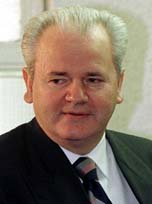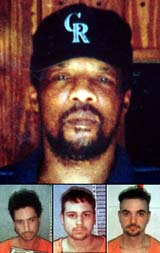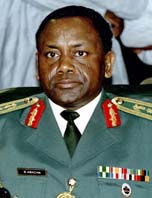Extra: Steven Brill's con game.


The Chicago Bulls won their sixth National Basketball Association championship in eight years. Michael Jordan nailed the game-winning jump shot with five seconds left, cementing his legacy as the greatest clutch performer of all time. Sports pundits gave the Bulls a few seconds to celebrate before bombarding them with questions about whether Jordan, sidekick Scottie Pippen, and coach Phil Jackson will return to the Bulls or disband the dynasty. Jordan worshippers debated whether he should retire on this perfect note or return in pursuit of even greater perfection. Cynics advised him to retire before the impending salary-cap war between players and team owners brings the NBA to a grinding halt. (6/15/98)

Independent Counsel Kenneth Starr confirmed he and his aides had briefed reporters on a not-for-attribution basis on the Monica Lewinsky case. Brill's Content, a new media magazine, broke the story. Publisher Steven Brill says the briefings violated Justice Department ethical guidelines because some of the information came from witnesses who were about to give the same testimony to the grand jury. Starr rejects this interpretation of the guidelines and says he is authorized to brief reporters whenever necessary to "counter misinformation" and "engender confidence in the work of this office." President Clinton's aides are demanding an investigation of Starr's conduct. (6/15/98)

Sunbeam CEO Al "Chainsaw" Dunlap, who earned his reputation and wealth by firing employees because they weren't helping the company's bottom line, was fired because he wasn't helping the company's bottom line. "A taste of his own medicine," clucked the Wall Street Journal. (Click here for David Plotz's "Assessment" of Dunlap and here for James Surowiecki's analysis of how Dunlap darkened Sunbeam's future.) (6/15/98)


NATO is planning military exercises in Albania and Macedonia to deter further Serbian aggression against Kosovo. Background: Yugoslav President (read: Serbian strongman) Slobodan Milosevic has launched a military assault on ethnic Albanian rebels who seek Kosovar (read: ethnic Albanian) independence from Yugoslavia. Lots of people have been killed or left homeless. NATO ministers say the exercises are designed to 1) scare Milosevic and 2) allow NATO to avoid actual military involvement. Skeptics argue that this is a contradiction. The United States doesn't want to undertake a military commitment in Kosovo because this is a U.S. election year. (Slate's "Gist" gives you a backgrounder on the conflict, and Laura Kay Rozen is filing "Dispatches" from Kosovo.) (6/12/98)

Mitsubishi agreed to settle a sexual harassment suit for $34 million, triple the previous record for such a suit. The case involved 300 women at an Illinois auto plant. The Equal Employment Opportunity Commission, which negotiated the settlement, says it will scare other companies into enforcing zero-tolerance policies on sexual harassment. Skeptics argued that Mitsubishi got off easy. (6/12/98)


Local and federal prosecutors are looking for grounds to execute the three whites charged with the vicious murder of a disabled black man in Texas. The men, who have been linked to the KKK and the Aryan Brotherhood, allegedly chained James Byrd Jr. to a pickup truck and dragged him two miles, tearing him to pieces. The district attorney wants to justify the death penalty by adding an additional felony charge, such as kidnapping. The FBI wants to charge the men with violating Byrd's civil rights. The Texas spin: Who'da thunk it could happen here? The out-of-state spin: Texas is in denial about its racism. The high-minded spin: The whole country is in denial. The anti-media spin: Why do we treat school shootings as a national epidemic but dismiss racial killings as isolated incidents? (6/11/98)

The Supreme Court heard arguments on whether the attorney-client privilege continues after the client is dead. (Slate's "Explainer" ponders the question.) Independent Counsel Kenneth Starr asked the court to strip this privilege from Vince Foster, the late deputy White House counsel, so Starr can see notes that Foster's attorney took from a conversation with Foster days before the latter's death. Starr thinks the notes may indicate that Hillary Clinton or others lied under oath about Travelgate. He argues that the privilege has already been curbed in some cases. Liberal editorialists replied that a victory for Starr would unacceptably deter other clients from speaking honestly to their lawyers, and they predicted the court will see it their way. (6/11/98)

Internet reporter Matt Drudge is charming his way into the punditocracy. Previously vilified for inaccuracy and recklessness, Drudge is drawing favorable reviews this week following a recent speech at the National Press Club. To learn how Drudge is rehabilitating his image, click

The Federal Trade Commission sued Intel for alleged antitrust violations. It says Intel denied three companies information about its chips (which they needed in order to develop products for the 80 percent of computers that are based on Intel chips), thereby forcing them to accept Intel's terms for use of their patented technologies. Intel agrees that this happened, but says it isn't against law. Skeptics say that 1) the case against Intel is far weaker than the case against Microsoft, because the allegedly victimized companies are Intel's customers more than its competitors, and 2) the government's picture of Intel as a fierce monopoly is outdated, since its market share is under assault. As though on cue, Intel cut its prices. (6/9/98)


Nigerian dictator Gen. Sani Abacha died, reportedly of a heart attack. Almost nobody is sorry. Experts debated whether he would be remembered more for his brutal tyranny or for his corruption and plunder of the economy. Western countries and Nigerian opposition leaders implored the military to use Abacha's death as an opportunity to restore civilian democracy. Instead, the military immediately named Abacha's top defense aide, a fellow general, to succeed him. The good news: The country might be angry enough to rise up against the military. The bad news: Lots of people might be killed in the process. (Read "International Papers" for media reactions from Nigeria.) (6/9/98)
